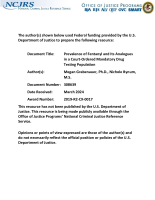No-Contact Orders, Victim Safety, and Offender Recidivism in Cases of Misdemeanor Criminal Domestic Violence: A Randomized Experiment
Journal
American Journal of Criminal Justice
Date Published
June 2014
Agencies
NIJ-Sponsored
Publication Type
Research (Applied/Empirical)




